Impacts: Crops
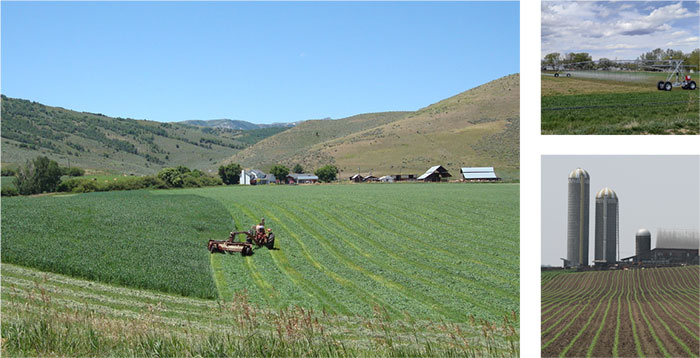
Producing a profitable field crop is no easy task. In many cases, farmers make at least 50 decisions for each crop each year regarding how to prepare, plant, fertilize, irrigate, protect, harvest, and market their crops. To better assist and help growers and the agricultural industry develop more profitable and sustainable farms, Utah State University Extension formed a crops team in 2018 that consists of nine state specialists and over 20 county faculty. This large team provides research-based expertise to field crop growers in all major areas of production, including agronomy, irrigation, weeds, pests, disease, soil fertility, soil health, and economics. Most of their emphasis is on major field crops such as grass hay, alfalfa, small grains, corn, and safflower, but the team also conducts and disseminates research on many other field crops including teff, soybean, mustard, flax, quinoa, hemp, and other alternative crops. The team has built upon and synchronized existing programs to develop several new and exciting efforts to help better inform, educate, and assist the agriculture industry in Utah. The impacts of these programs are described below. Learn more at crops.usu.edu
Sincerly,
- Matt Yost
Agroclimate Extension Specialist - Earl Creech
Extension Agronomist - Corey Ransom
Extension Weeds Specialist - Grant Cardon
Extension Soils Specialist - Ricardo Ramirez
Extension Entomologist - Niel Allen
Extension Irrigation Specialist - Claudia Nischwitz
Extension Pathologist - Rhonda Miller
Extension Environmental Quality Specialist
On-Farm Research
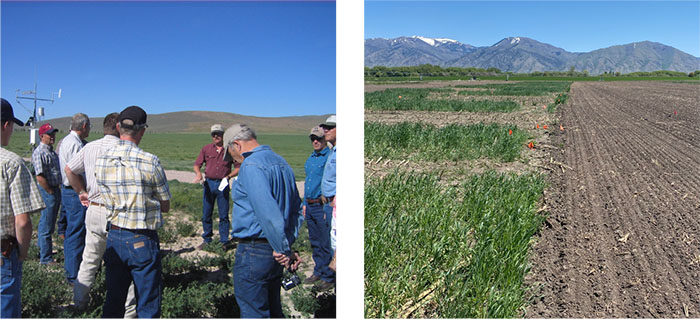
Each year, the USU Extension crops team partners with nearly 40 Utah farmers in various parts of the state to conduct applied research. Farmers often help implement some of the treatments such as new irrigation, fertilizer, or pesticide products or application methods. Many also help host field days on their farms to showcase and demonstrate the research to other farmers, crop advisors, state agencies, and others in their region. When farmers participate in the research, or when it is conducted close to where they live, it improves the acceptance, use, and adoption of research-based crop management.
E-articles
Each month, the USU crops team prepares and sends short e-articles. The content of these articles covers many aspects of field crop production including agronomy, weeds, pests, economics, soils, irrigation, and others. Subscribe at tinyurl.com/CropsNews.
- 1,400 current subscribers
- 25 articles generated
- 10,000 views by subscribers
Training Professionals
Partnering with and training agricultural professionals is a large part of the mission of USU Extension. To fulfill this mission, USU Extension periodically hosts workshops, trainings, and roundtable events to build relationships with industry and government partners, gather feedback on research and Extension needs, and provide crop management training. Three recent events included an irrigation industry workshop, crop advisor roundtable, and a soil health workshop.

Irrigation Industry Workshop
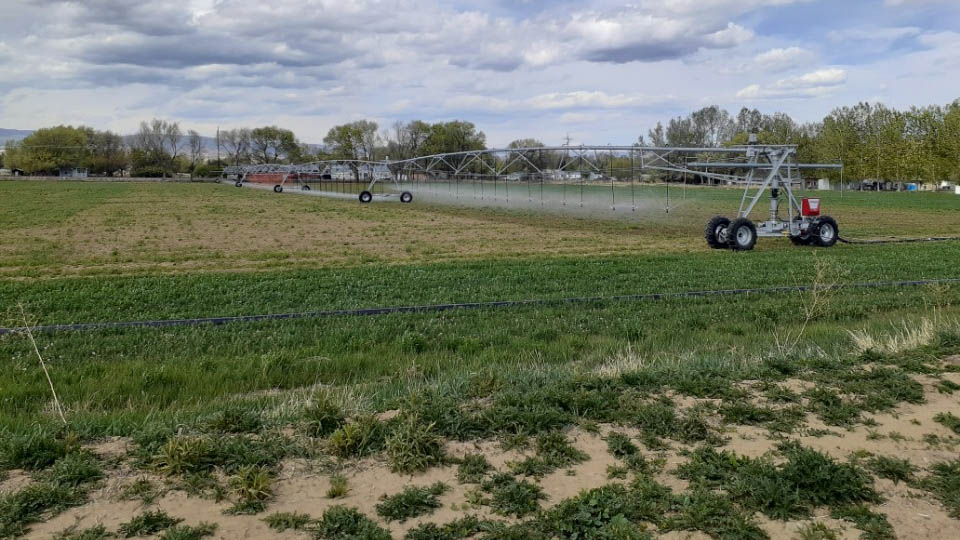
In August 2019, the USU crops team invited all irrigation dealers in Utah and Southeastern Idaho to attend a 2-day irrigation workshop in Wellsville, Utah. This was the first time the industry has come together for a workshop, and it was a large success. There were 50 attendees, including nearly all of the irrigation dealers in Utah. These dealers service irrigation systems on over 2.5 million acres of farmland. The workshop included reports of recent irrigation-related research, industry presentations, demonstrations and tours of irrigation research trials, and discussions on irrigation research and educational needs. All irrigation dealers who completed evaluations indicated that the workshop should be repeated and that they gained knowledge on best irrigation practices.
Great meeting. I learned a lot from both the Extension and industry sides. I really liked the mix and thought it added to the success of the meeting. Great use of time. Please do this again.
UAVs in Ag Workshop
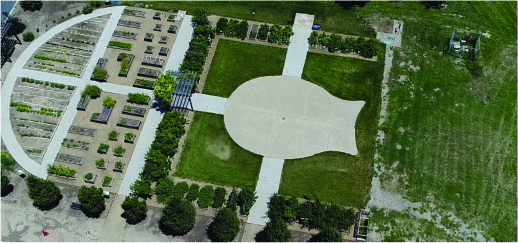
In November 2019, an “Unmanned Aerial Vehicles (UAVs) in Agriculture Workshop” was held for specialty crop producers. Attendees learned about FAA rules and regulations, the types of UAVs and cameras available, and received hands-on experience analyzing images taken with UAVs. The workshop was well received by attendees, and several indicated they either had a UAV or were planning to get one.
Crop Advisor Roundtable
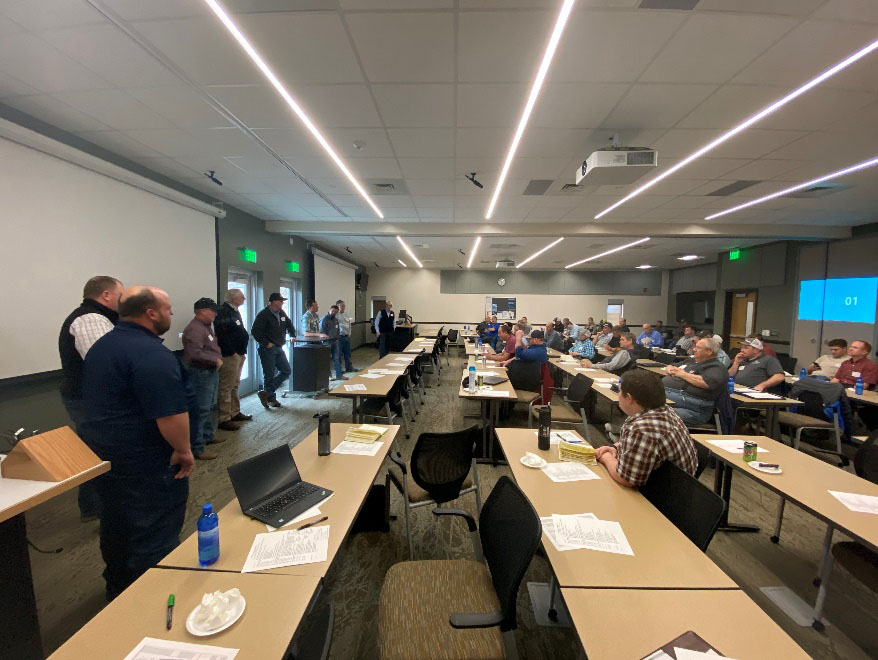
In January 2020, the USU Extension crops team hosted the first Crop Advisors Roundtable in Utah. All crop advisors in the state were invited to the one-day event in Kaysville, Utah. The agenda included several short presentations from Extension and industry crop advisors across the state, training on evaluating and conducting applied research trials, followed by several large and small group discussions. It focused on many aspects of crop production including weeds, pests, agronomy, irrigation, soils, and economics. The training was a huge success, strengthening the trust and partnerships between USU Extension and the crop advisor industry in Utah.
- 60+ crop advisors in attendance
- 1 day event in Kaysville
- 12 priorities in each main topic area
- 48 research and education priorities
I wanted to let you know that a lot of the guys really enjoyed the crop advisor roundtable. You did a great job! I think the industry guys gained a lot more trust in how to work with you.
Main topic areas covered:
- Agronomy/economics
- Irrigation
- Weeds/pests
- Soils
Four major goals of the roundtable were to:
- Present and discuss recent industry and Extension research results.
- Prioritize and plan coordinated research and education efforts.
- Provide training related to on-farm experimentation.
- Present and discuss recent and emerging field crop issues in Utah.
Soil Health Workshop
Soil health is a topic of great interest in Utah. Several state agencies are seeking to advise and support Utah farmers wanting to build their soil health. The USU crops team partnered with the Utah Department of Agriculture and Food (UDAF) and Natural Resource Conservation Service (NRCS) to host a workshop in February in Brigham City. The attendees included advisors from all three organizations who oversee 100,000+ acres in more than 16 Utah counties. The event included presentations on the latest soil health research in Utah, experiences from Utah farms, panel discussions, and group discussions.
- 2 day event
- 6 workshop attendees
- 65 major needs identified to advance soil health in Utah
The Attendees responses to the workshop:
- 80% were satisfied with the information.
- 70% gained knowledge and plan to advise farmers on soil health decisions.
- 100% would attend the workshop again.

Crop Programs
Crop Schools
Each year, USU Extension offers 10 to 15 county crop schools. Crop schools are generally half-day or evening events and are held in nearly all counties with major farmland. They consist of presentations by USU Extension faculty and others on many aspects of field crop production including pesticide use, safety, and law. A total of 500 to 600 farmers, crop advisors, state agency personnel, and other interested stakeholders usually attend these schools each year. Farmers who attend represent over 180,000 acres, and crop advisors give advice on nearly all of the 1.6 million acres of farmland in the state.
One of the things that I have appreciated with these meetings is the partnership that we have had in industry with Utah State University. They do really well at tailoring their programs to the crops and areas so that it is specific to what the audience needs.
The 331 participants’ responses to the schools:
- 92% were satisfied with the information and the delivery of the information.
- 83% rated these schools as “very good” or “exceptional.”
- 76% intend to use the content from the school to improve their crop management.
- 85% gained knowledge.
Sustainable Grazing Institute
The Sustainable Grazing Institute (SGI) promotes improved grazing practices and sustainability of forage resources throughout Utah. To date, the SGI has hosted two management intensive grazing workshops where the science and art of grazing is merged. Participants learn the science in the classroom and implement the art as they make management decisions designing pastures for grazing livestock.
Paricipants’ responses to the Institute:
- 91% gained new skills.
- 86% will apply something new to their farm or ranch.
"I've heard and seen people estimate tonnage on land and estimate the amounts needed to feed cattle, but learning to calculate it on site was so awesome! Definitely something I'll use often on our operations." - Participant
Utah Hay and Forage Symposium
The Utah Hay and Forage Symposium has been held in odd-numbered years over the past 30 years in St. George. Local and national speakers address critical and current issues facing Utah hay and forage producers. A hands-on alfalfa diagnostic workshop is offered the day before the symposium to train participants in diagnosing in-field problems.
300-400 farmers, ranchers, and crop advisors’ responses:
- 98% gained new, relevant knowledge.
- 98% believed their new knowledge would lead to greater profits.
I enjoy coming to these workshops to learn more about what I can do to improve the operation and management of my farm. I enjoy the association with the other farmers and ranchers in the area and also being able to get information from the Extension specialists, get questions answered, and think about new ideas and things that I might try to improve my operation.
Field Days
Each year, the USU crops team conducts 10-15 field days in various parts of the state. This includes reoccurring field days at USU farms like Blue Creek, Kaysville, and Greenville, and several on-farm field days to showcase on-farm research trials.
Blue Creek Field Day
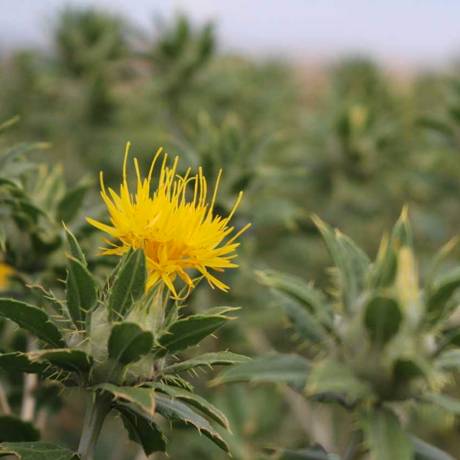
Utah’s agricultural producers are faced with the need to optimize crop inputs and maximize profits. Crop response to management can vary due to climate, geography, soils, pest problems, field history, and other factors; therefore, research to generate management recommendations on crop inputs for Utah farmers and ranchers is necessary and most relevant if conducted within the state.
The Blue Creek Research Farm focuses on small grains breeding, conservation tillage techniques, soil fertility, rangeland grass varieties, forage kochia, safflower production, and other dryland agricultural problems and concerns. Field days are held there every other year.
Wheat plant breeding has been ongoing there, with several new wheat varieties released every few years, and dryland tillage practices and fertilizer studies have benefited local growers over the years. Scientists from the USDA-Agricultural Research Service Forage and Range Research Laboratory (housed at USU) conduct field work at Blue Creek, and the USU crops research team is currently running studies to help growers remain economically viable. Field experiments at the Blue Creek research farm and local fields generate the information necessary to help Utah agricultural producers make the best management decisions regarding crop inputs on their operations.
I really like how it was all about issues related to today’s problems. Great presenters!
My first time at the Field Day. The information presented is very helpful. I will attend again in the future.
2020 Virtual Field Day
- 10 field days were replaced with this virtual field day due to the COVID-19 pandemic.
- 2 day event
- 7 main sessions
- 30+ field day speakers
- 50 tours and presentations
- 260 registered attendees
- ~70 attendees in each session
Attendees responses to the event:
- 87% were satisfied with the sessions.
- 50% had a high or very high knowledge gain.
- 60% were crop advisors and farmers.
- 35% had never attended a USU field day.
- 100% would attend again and recommend it to others.
- >50% felt the meeting should be repeated at least twice a year.
Watch sessions of the virtual field day at tinyurl.com/CropsFieldDay.
Social Media
In the early part of 2019, the USU crops team started three social media accounts to provide more frequent education and research updates to a more diverse and widespread audience.
165 Posts
272 Followers
40,000+ people reached
146 Posts
547 Followers
30,000 people reached
107 tweets
98 followers
21,000+ impressions


 Utah 4-H & Youth
Utah 4-H & Youth